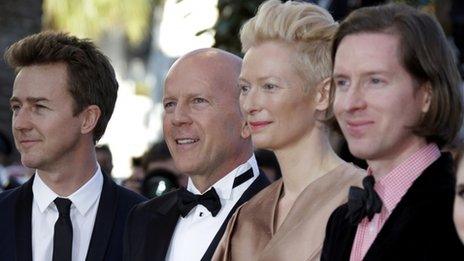Wes Anderson's Grand Budapest Hotel reunion
- Published
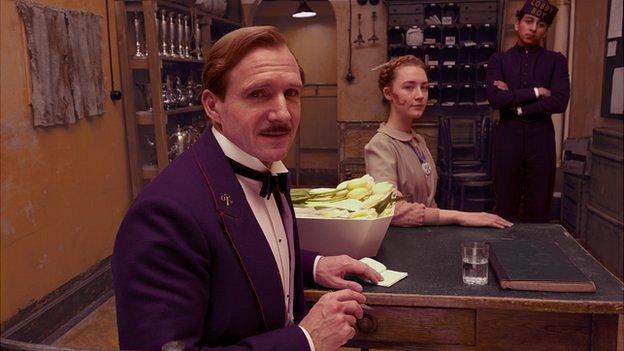
Ralph Fiennes makes his debut in a Wes Anderson film as concierge Monsieur Gustave H.
Wes Anderson talks to the BBC about his new film The Grand Budapest Hotel, which launched the Berlin Film Festival and opens in UK cinemas on 7 March.
Many great cinematic oddities and eccentrics have flowed from the pen of US director Wes Anderson - Max Fischer, Royal Tenenbaum, Steve Zizzou and the latest addition to the list, Monsieur Gustave H, the concierge at The Grand Budapest Hotel, the titular establishment of Anderson's latest movie.
The Grand Budapest Hotel reunites the director with regular cohorts Jason Schwartzman, Willem Dafoe, Owen Wilson, Adrien Brody and, of course, Bill Murray.
Added to the cast are Tilda Swinton, Harvey Keitel and Ed Norton from his previous and most successful film to date Moonrise Kingdom. And then there is Ralph Fiennes in the central role of the unflappable Gustave H.
A serial romancer of his elderly guests, a liberal user of L'Air de Panache cologne, prone to spontaneously bursting into recitation of romantic poetry and a stickler for the finest details of life and service in the imaginary mountaintop spa hotel in the fictional eastern European nation of Zubrowka.
Fifty percent art heist, 50% murder mystery, 100% Anderson, the film stars veteran actor F. Murray Abraham as the mysterious Mr Moustafa, who relates to Jude Law's author the tale of how, after being taken under the wing of Gustave, he rose from the lowly rank of lobby boy to become the owner and proprietor of the Grand Budapest Hotel.
Fiennes brings a lightness of touch to the character who in the hands of lesser actors may have come across as buffoonish.
Though Fiennes is not perhaps best known for his comedic roles, save for his amusingly profane and utterly terrifying role in Martin McDonough's In Bruges, Anderson says he was never in doubt of his lead actor's abilities.
"He's very scary (in In Bruges) but he's funny, like all of (director) Martin McDonough's work, it's all funny.
"I assume it's because in Schindler's List, he made such an impression that it steered him in that direction. He did do The English Patient and Quiz Show. He's played a range of parts but I suppose he hasn't played one quite like this. I never had a second thought about it."
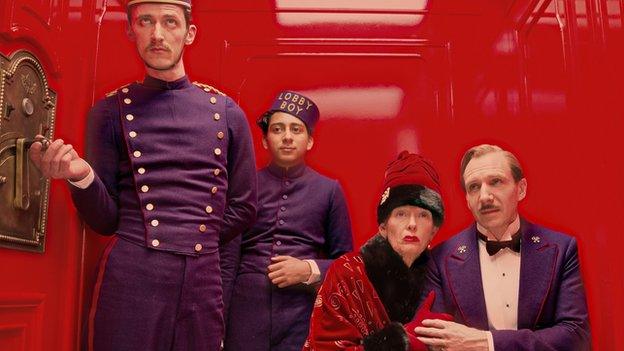
Tilda Swinton is heavily made up to play the role of the octogenarian Madame D
Anderson reveals Fiennes almost made it into the final draft of the script for his previous film.
"I haven't mentioned this to Ralph but in Moonrise Kingdom, there was a character in the story that isn't in the movie but was a part of it in its early stages that I always imagined him playing - it was a darker character who was in the mix.
"I haven't thought about this for ages but now that I do, it probably wouldn't have done the movie any harm to have this character and Ralph would gave been very good in it.
"But anyway, its too late," he adds wistfully.
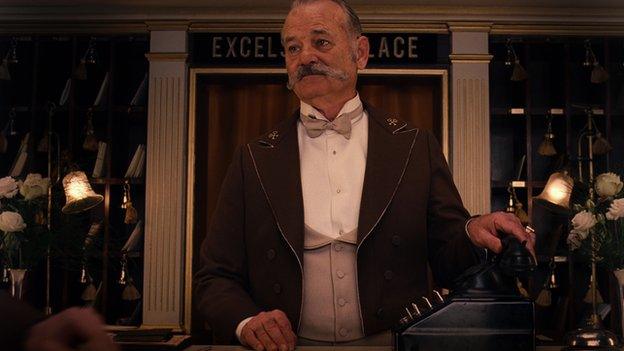
Bill Murray is an Anderson regular, having starred in seven of the director's eight movies
In amongst his big name cast, Anderson has cast a brand new face as the young Zero Moustafa. That face belongs to 18-year-old Tony Revolori.
Like Jared Gillman and Kara Hayward in Moonrise Kingdom, who were cast following open auditions at US high schools, Anderson says he "wanted to have someone that no-one recognises".
"I rarely want to have children in movies where we know this kid, I wanted to find somebody new. But its complicated because they're not waiting there to be found, you've got to get them.
"He could have come from Israel or Lebanon or Egypt but he's from a made up country. We searched everywhere in that part of the world and in Europe but we found him in Anaheim in California."
The character is a refugee from a fictional country in the middle east though his accent doesn't betray his roots. In fact, the entire cast was urged to use their own accents rather than adopt a generic Hollywood-style Russian schtick for the movie's duration.
The effect is less jarring than Sean Connery's Edinburgh twang while playing a Russian submarine commander or Colin Farrell , external(and weirdly Val Kilmer) using Irish accents in the flop epic Alexander.
"We could have gone the old-fashioned way where, in American movies set in Prague or Warsaw, the people talk like Jack Benny and James Stewart," explains Anderson.
"We have Americans, some English, Saoirse Ronan speaks in her own Irish accent and they're all meant to be from the same country Zubrowka - except for Tony who's from Aq-Salim-al-Jabat."
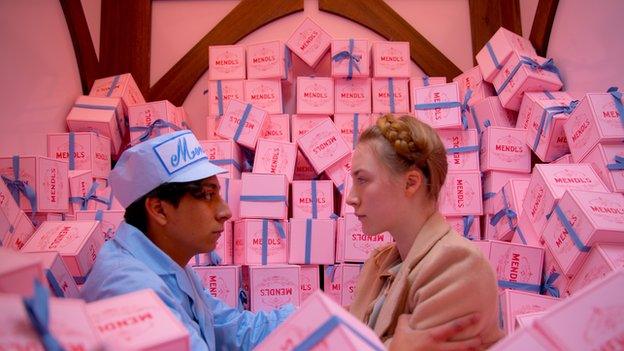
Tony Revolori was cast by the director and makes his film debut in The Grand Budapest Hotel
The movie has opened both the Berlin and the Glasgow film festivals and has been enthusiastically received.
In its review, Variety praised Anderson's "captivating 1930s-set caper," which "offers a vibrant and imaginative evocation of a bygone era".
However, some film buffs remain unconvinced, external by Anderson's flights of whimsy and suggest that, at least in visual terms, Anderson has failed to move far from his comfort zone.
While an Anderson film is unquestionably easy to spot thanks to his frequent use, external of certain camera angles and framing techniques, the filmmaker insists he attempts to make all his films different.
"I always feel that I am trying something, I don't know if it's radically different but I feel I'm definitely doing something different.
"This movie is set in three time periods in Europe and its interpretation of history is maybe a sort of riff on historical events.
"It's set in eastern Europe, it's got lots of dialogue and it's also quite violent - it's different from what I've done.
"But when I go about making the film, it begins to resemble my other work and so when I'm looking at the end result, I don't exactly control how that evolved."
The Grand Budapest Hotel is out in UK cinemas on 7 March.
- Published7 February 2014
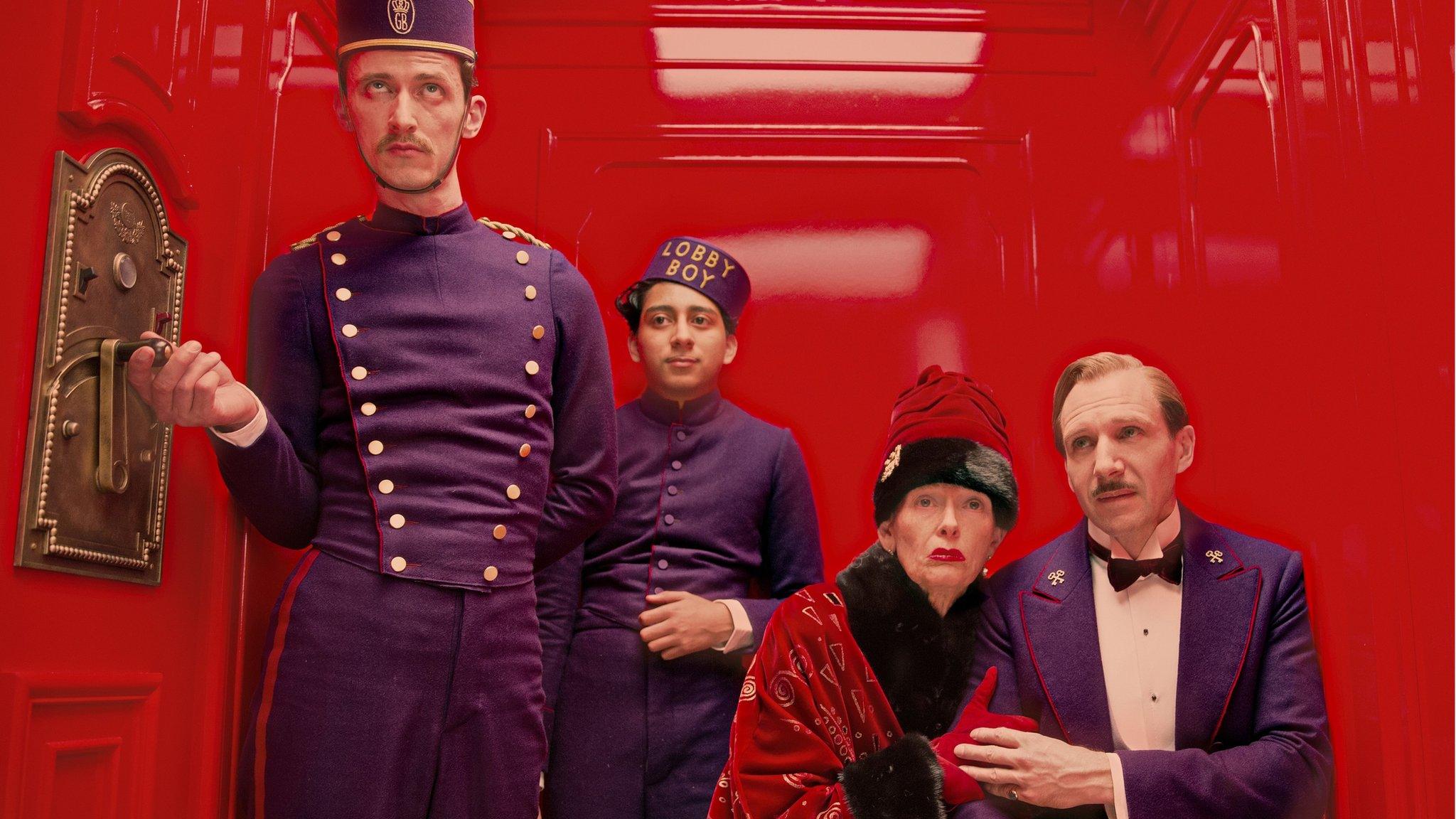
- Published7 February 2014
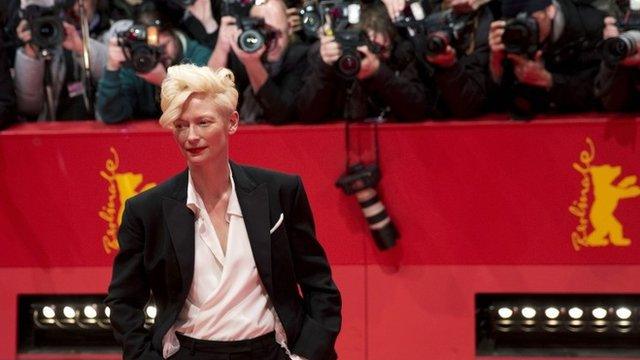
- Published21 January 2014
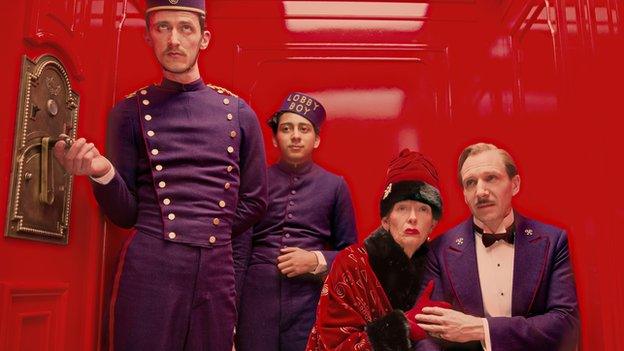
- Published16 May 2012
